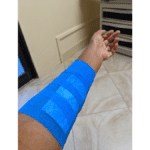Our days are numbered, so why not live them better?
We are diligent worker bees and Queens. We make to-do lists and check off the items because we feel like this orderly process helps us stay organized and productive.
If you’re like me, you probably have several different to-do lists—one for your household, one for finances, several for work projects…heck, you probably have a list for your to-do lists (ahem…consolidate to-do lists)!
I live by my checklists because I crave order and structure. They help me feel in control of planning and accomplishing tasks. But I’ve learned that while they are handy, to-do lists also provide a false sense of control and can disconnect us from vital moments. We end up shortchanging our present to prepare for a day we might not see.
With that in mind, I invite you to take a hard look at one of your lists. It could be the one on your phone, notepad, Evernote, or Google doc. Doesn’t matter. Now, read it out loud, don’t rush. I’ll wait.
Read your to-do items, and don’t dare add anything new. I see you thinking about that email that needs sending. Stop.
If you knew that tomorrow would be your last day of life, would any of your to-do lists still feel important? Or would you chuck the list to do what you really want to do, like go on the adventure you’ve shelved, publish the story or song in your heart, or spend time with a friend or loved one?
Seriously, would you regret the social media update or work email you didn’t send if you were on your deathbed?
My perspective about productivity and priorities changed after I had a life-altering experience.
The Beginning of the End
I was 32 years old when I had my first cardiac “event.” I didn’t know what was happening to me, but I knew it wasn’t good.
It started with weakness in my right hand that I chalked up to carpal tunnel, but then I tried to pick up a glass and couldn’t move my fingers.
Later, my seemingly benign heart palpitations graduated to a stampede; it was so jarring that I’d have to sit down to steady myself. But the worst feeling was losing the ability to think of and say simple words.
What started as a typical day turned into a nightmare. I was talking to my husband, and suddenly, I couldn’t think of how to say “that.” I tried to see the letters in my mind, but they were jumbled; I tried to speak to sound them out, but no words came out.
Suddenly I felt like I couldn’t breathe, it was like something was pressing on my chest while squeezing my brain, and my vision got blurry. I thought I was having a stroke.
I saw numerous doctors and specialists who tested me and ruled out MS, Parkinson’s Disease, Fibromyalgia, and a host of other things. Finally, I saw a cardiologist.
I’m Dying, Now What?
Sitting in the doctor’s office, waiting for my results, I was convinced he’d tell me my days were numbered and I should get my affairs in order. I was mentally writing my will when he walked in with the news.
With sad eyes, he said, “I’m sorry but it doesn’t look good.”
Then continued, “Without immediate intervention, your condition will only get worse and next time recovery may not be an option.”
I was floored.
At that moment, my world stopped. In an instant, I was sad for all the days I wasn’t going to see, sorry for the amends I wouldn’t have a chance to make, and sorry for all the days I didn’t embrace with gratitude.
I wanted to reach into my chest, cradle my weak heart, and tell her that I wish I’d treated her better. But, mostly, I wanted to scream because I realized at that moment how much time I’d wasted being preoccupied with worry about things that ultimately didn’t matter much.
Just short of totally breaking down, I asked the doctor what was wrong with me and what disease I had to battle to stay alive because surely this couldn’t be the end for me.
My cardiologist explained that the sudden numbness in my arm and hand, partial loss of vision, mental fog, and short-term memory loss resulted from genetics and… stress.
Say what now?
“Aside from your symptoms, you’re healthy, but you must find a way to calm your mind, slow down, and release your need for control. Consistent stress on your heart and body can cause irreparable damage and death,” he said.
It’s been a while, so I’m paraphrasing, of course, but really, drama much?
He said that given my family history of heart disease, I should consider this experience a wake-up call and do better.
Stress Kills
Stress? STRESS?? Stress. No.
Initially, I didn’t believe him, so in true OCD fashion, I researched the effects of stress. I was shocked to learn that stress can cause rapid heartbeat, feelings of constant worry and anxiety, forgetfulness, inability to focus, disorganization, mental health issues, and depression.
Additionally, unchecked stress can contribute to many serious health problems, such as high blood pressure, heart disease, obesity, and diabetes.
I honestly didn’t realize how severe stress could affect health and wellness. I knew it wasn’t great, but I assumed I was using stress to my advantage.
I thought that organized chaos was necessary for being “busy.”
I was nearly dead wrong.
We’re all dying a little bit every day, but we shouldn’t help the process.
Flip The Switch, Live Better
We know we’re not being good to ourselves when we fail to practice self-care and instead pile more onto our plates and to-do lists.
My cardiac event helped me realize that even though we’re dying a little bit every day, we shouldn’t help the process by forgoing the things we want to do in favor of the things we think we should do all the damn time.
Adjust your mindset about your projects and priorities.
How attached are you to all the things you’ve tasked yourself with and are those tasks genuinely worth it?
Are you filled with joy or dread when reflecting on your to-do lists?
If it’s the latter, you might reconsider if those things truly serve you well.
I still have my to-do lists and check off items to stay organized and focused, but I’m more at ease with letting some things slide.
Also, I will gladly chuck a list when I find that a plan or project isn’t serving me mentally and emotionally. I’m learning to be more impulsive and selfish with my time.
More importantly, I’m learning to live my life like tomorrow may be my last because there’s a genuine possibility that I may not wake up to see it.
I’ve decided that every new day is a gift and an opportunity for me to choose what’s important, and I’m making space in my life to live on purpose.
Decide what’s important to you and what things genuinely bring you joy.
Decide To Be Present
You may feel like there is always more to do, more projects and tasks that require your attention, and more to add to your to-do list that must get done. But really? Busy isn’t necessarily better.
Don’t neglect yourself and your health in the pursuit of being busy or overly organized. Instead, decide what’s important to you and what things genuinely bring you joy.
Focus on today, focus on right now. What do you want to do with your time?
What would you do with it if you knew that today was your last?
Takeaways:
- We die a little bit every day. Make your days feel worth it.
- Busy isn’t better. We are defined by what we give priority.
- Moments are the tasty morsels of life—show up for them. Be present.



